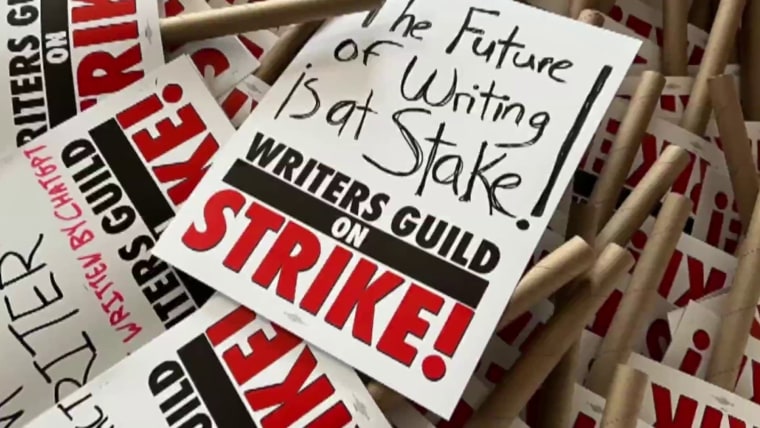
Hollywood writers are on strike.
Thousands of unionized screenwriters who say they are not paid fairly for their work were headed for the picket line Tuesday after high-stakes negotiations between a top guild and a trade association representing Hollywood’s leading studios failed to avert the first major walkout in over 15 years.
The strike took effect at 12:01 a.m. PT Tuesday. The Writers Guild of America more than three hours earlier said the board of directors voted unanimously to call a strike.
“The WGA Negotiating Committee began this process intent on making a fair deal, but the studios’ responses have been wholly insufficient given the existential crisis writers are facing,” the union said in a statement.
The strike means production on some of your favorite broadcast shows, streaming series and potentially some films will effectively grind to a halt, upending the industry.
In some cases, the impact will be clear immediately: Late-night talk shows are expected to go dark this week, for example, and NBC’s “Saturday Night Live” could nix this weekend’s episode. In other cases, the producers of scripted drama and comedy series may be forced to cut their seasons short or delay filming altogether.
The existing contract between the WGA and the Alliance of Motion Picture and Television Producers, or AMPTP, expired at midnight PT Tuesday. Ninety-seven percent of WGA writers voted to authorize a strike in the event a deal could not be reached. (Comcast, the corporation that owns NBCUniversal, is one of the companies represented by the AMPTP.)
The AMPTP said Monday night that negotiations between it and the writers guild Monday failed to reach an agreement.
“The primary sticking points are ‘mandatory staffing,’ and ‘duration of employment’ — Guild proposals that would require a company to staff a show with a certain number of writers for a specified period of time, whether needed or not,” it said.
The stakes and the demands
The work stoppage comes amid intense economic and technological upheaval in the entertainment industry, which is grappling with the increasing dominance of streaming services, the decline of traditional broadcast viewership and even the rise of artificial intelligence, which has stoked anxiety about the future of creative professions.
WGA members are seeking pay increases and structural changes to a business model that they say has made it increasingly difficult to make a living. In recent years, amid the explosion of streaming platforms such as Netflix and Disney+, median writer-producer pay has declined 4%, or 23% when adjusted for inflation, according to WGA statistics.
“The companies have used the transition to streaming to cut writer pay and separate writing from production, worsening working conditions for series writers at all levels,” the WGA said in a March 14 bulletin titled “Writers Are Not Keeping Up.”
The guild added that more writers are “working at minimum regardless of experience.” In contrast, salaries for top entertainment executives have ballooned in recent years.
The WGA said Monday that “the companies’ behavior has created a gig economy inside a union workforce.”
It said that the companies “opened the door to writing as an entirely freelance profession,” citing things like a day rate for comedy variety, and that “no such deal could ever be contemplated by this membership.”
In a video message published April 11, comedy writer and producer Danielle Sanchez-Witzel (“The Carmichael Show”), a member of the WGA’s negotiating committee, said “this is not an ordinary negotiating cycle,” adding, “We’re fighting for writers’ economic survival and the stability of our profession.”
The writers in the union are particularly frustrated that streaming-era shows run for fewer episodes than their broadcast counterparts, making it tough to maintain a consistent income. In addition, residual fees — money paid when a show is put into syndication or aired overseas — have all but disappeared as more content is hosted exclusively on streaming platforms.
In an interview with “NBC Nightly News,” Raphael Bob-Waksberg, the creator of Netflix’s animated series “BoJack Horseman,” explained the writers’ demands in stark terms.
“We want more money,” Bob-Waksberg said. “We want enough money to make a basic living doing what we love.”
“I think we’re getting to the point where it’s going to be that the only people who can afford to try to start a career in television or movies are going to be people who are independently wealthy already, which I don’t think is good for television or movies. I don’t think we want that,” he said.
In a statement released two days before the negotiations failed, the AMPTP said it had been working to “reach a fair and reasonable agreement.”
“AMPTP companies have approached these negotiations with the long-term health and stability of the industry as our priority,” the group said. “We are all partners in charting the future of our business together and we are fully committed to reaching a mutually-beneficial deal.”
The AMPTP said Monday that its offer to the guild “included generous increases in compensation for writers as well as improvements in streaming residuals.”
The AMPTP represents major film studios such as Disney, Universal Pictures and Warner Bros.; the top broadcast television networks, like ABC, CBS and NBC; and the leading streaming services, including Netflix, Disney+ and Amazon. (Universal Pictures is a unit of NBCUniversal, the parent company of NBC News.)
WGA members last went on strike in November 2007 amid an impasse with the AMPTP over writers’ salaries and other issues. The work stoppage clogged Hollywood’s content production pipeline and lasted 100 days, ending on Feb. 12, 2008.
The union currently faces issues that might have been unfathomable during the last strike, when Netflix was best known for shipping DVDs in red envelopes and traditional network television channels still generated mammoth ratings.
In one sign of the times, the WGA’s demands for this negotiation cycle include regulations for the “use of material produced using artificial intelligence or similar technologies.”

 Latest Breaking News Online News Portal
Latest Breaking News Online News Portal





